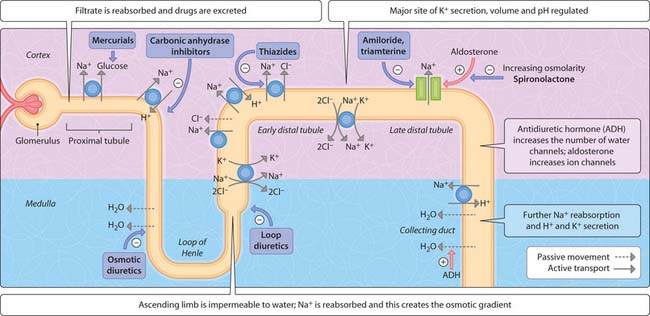17 Diuretics
The kidney is the site of excretion of metabolic waste and drugs; it regulates body water and mineral content and secretes hormones (renin, erythropoietin) (Fig. 3.17.1). Any condition that leads to an increase in interstitial (extracellular) volume (e.g. nephrotic syndrome, liver disease and congestive heart failure) will result in tissue swelling and symptoms (e.g. dyspnoea in pulmonary oedema). In nephrotic syndrome, there is an increase in the permeability of the glomerular basement membrane to proteins, leading to a marked loss of protein in the urine (proteinuria). This loss of protein results in a fall in plasma protein oncotic (colloidal) pressure and, hence, fluid flows into the extracellular spaces. This fall in blood volume then activates the renin–angiotensin system to promote Na+ and water retention by the kidneys, thereby increasing fluid retention by tissues. In liver disease, a decrease in protein synthesis also reduces hydrostatic pressure within the circulation, which favours the flow of water into tissues (e.g. peritoneal cavity; a process termed ascites). The ensuing loss in blood volume activates the renin–angiotensin system.
Drug treatment
A variety of drugs promote Na+ excretion and water loss by a selective action on the kidney (Fig. 3.17.1).
< div class='tao-gold-member'>
Stay updated, free articles. Join our Telegram channel

Full access? Get Clinical Tree





